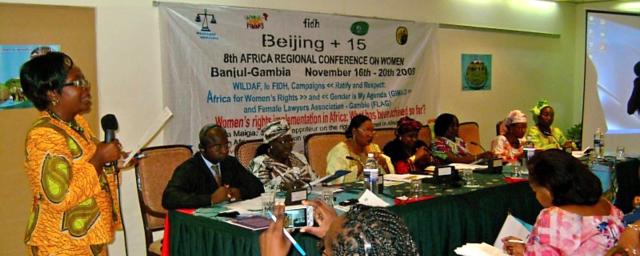
Photo courtesy of Women in Law and Development in Africa
For more than three decades, Women in Law and Development in Africa (WiLDAF) has stood at the forefront of feminist advocacy, ensuring that African women’s voices are not only heard, but also shape the decisions made in global and regional spaces. From the historic Nairobi Conference of 1985 to present-day struggles within shrinking multilateral spaces, WiLDAF’s journey reflects both the progress achieved and the persistent challenges confronting women’s rights.
Mme. Kafui Adjamagbo-Johnson takes us through that journey - celebrating milestones, confronting setbacks, and reimagining what true feminist engagement in multilateralism must look like in the years ahead.
Where It All Started
Women in Law and Development in Africa (WiLDAF) was created in 1991, as a pan-African women’s rights network with its regional secretariat initially based in Harare, Zimbabwe. Prior to its formal creation, some of its founding members participated in the 1985 Nairobi Conference on women, where they sought to influence the outcome of the conference. At the heart of its advocacy were concerns about African women’s rights and the widespread discrimination against women and girls. One of the lessons learnt from that experience was the urgent need for African women to organize, collaborate, and amplify their voices, particularly within multilateral forums.
Since its creation, WiLDAF has actively engaged at multiple levels:
- Globally, through its participation in the UN Conference on Human Rights in Vienna in 1993, the Beijing Conference in 1995, and regular engagements with the Commission on the Status of Women (CSW);
- Regionally, through advocacy with the African Union; and
- Subregionally, through its involvement with the Economic Community of West African States (ECOWAS) and related bodies.
These engagements have been critical to advancing the rights of women and girls across the continent and to ensuring that African women’s voices are represented in global decision-making spaces.
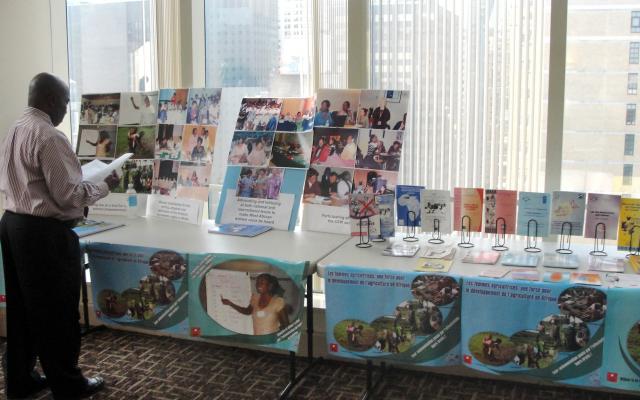
Photo courtesy of Women in Law and Development in Africa
Tracing the Arc of Feminist Demands: Past Milestones, Present Battles, and Future Horizons
At the time, the key aspirations of feminist activists, especially those engaged through WiLDAF, centered on the recognition and protection of the rights of African women and girls.
During the 1993 Vienna Conference on Human Rights, where WiLDAF served as the focal point for women’s rights, the key demand was for women’s rights to be recognized as human rights. This marked a historic milestone, as it was the first time a global outcome document explicitly affirmed that women’s rights are human rights.
Later, at the 1995 UN Beijing Conference on Women, the agenda expanded further. In addition to advocating for the elimination of violence against women and the promotion of women’s rights, WiLDAF, in collaboration with other African women’s networks such as FEMNET (The African Women’s Development and Communication Network), successfully pushed for the inclusion of the rights of the girl child as one of the critical areas of concern in the Beijing Platform of Action.
At the African Union level, WiLDAF, together with the African Commission on Human and People’s Rights, they influenced the process that led to the adoption of a dedicated legal instrument on women’s rights in Africa. This advocacy started in Lomé, Togo during a seminar on the African Charter on Human and People’s Rights and Women’s Rights in Africa. At this meeting, WiLDAF strongly argued for a separate, specific instrument to complement the Charter and ensure the comprehensive protection of women’s rights in the continent. This proposal was accepted and marked the beginning of a historic process. WiLDAF then led and facilitated the engagement of women’s rights organizations throughout the drafting, advocacy, and adoption phases of what would become the Protocol to the African Charter on Human and Peoples’ Rights on the Rights of Women in Africa, commonly known as Maputo Protocol, adopted in 2003.
In addition to this, and working together with other African women’s networks, they successfully advocated for the adoption of the Solemn Declaration on Gender Equality in Africa by the African Heads of States in July 2004. This Declaration addresses critical issues such as gender-based violence (GBV) and women’s participation in decision-making, and calls for actions to achieve gender equality across the continent.
When Sustainable Development Goals (SDGs) were adopted in 2015, WiLDAF had pushed for the inclusion of Priority 5 on gender equality as well as the mainstreaming of gender equality across the entire SDG framework. At the ECOWAS level in West Africa, in collaboration with other organizations, WiLDAF successfully advocated for the adoption of the Supplementary Act on Equality of Rights between Women and Men for Sustainable Development by the Heads of States in 2015.
While there have been notable advancements in the development of global, regional, and subregional policies and legal instruments, implementation remains a significant challenge. Although many countries have aligned their national policies and laws with these frameworks, concrete actions to ensure widespread awareness, enforcement, and protection of women’s and girls’ rights are still lacking. In many cases, States have done little to support women whose rights have been violated, prosecute perpetrators of GBV, or provide reparations to women survivors.
Furthermore, harmful social norms and stereotypes continue to justify and perpetuate discrimination against women and girls. Consequently, feminists’ aspirations remain focused on achieving both de jure (in law) and de facto (in practice) gender equality.
Over the years, new concerns have emerged on the feminist agenda, including women’s participation in decision-making, the intersection of gender and climate change, women’s rights in environmental justice, the gender digital divide, and the implications of artificial intelligence for gender equality.
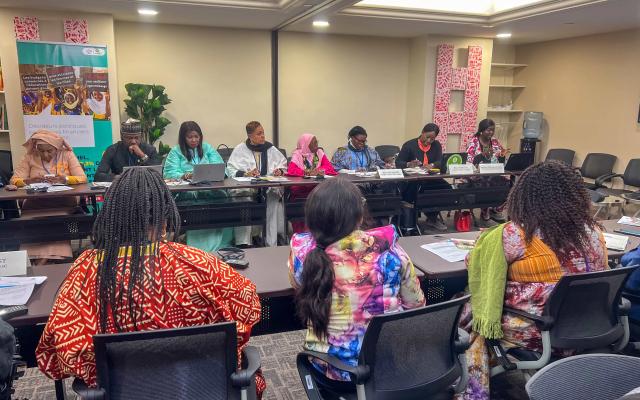
Photo courtesy of Women in Law and Development in Africa
Challenges in the multilateral spaces
One of the primary challenges observed by WiLDAF in multilateral spaces is the difficulty of mastering the procedural rules and protocols that govern these forums, which is essential for ensuring that the voices of women from civil society are effectively heard. To meet this challenge, training sessions are often organized for new participants at the beginning of these meetings. However, we must recognize that this approach alone is insufficient. Maximizing the impact of civil society engagement requires not only a deep understanding of the rules but also robust organizational coordination and sufficient human resources. Ensuring effective participation and influence within these complex spaces remains a continuous challenge.
Shrinking civic spaces in multilateral forums
Opportunities for civil society to engage with and dialogue alongside official delegates in multilateral spaces are increasingly shrinking. Civil society participants consistently face challenges in gaining access to official sessions, interacting with government delegates, and entering negotiation rooms or organizing parallel events within UN premises. These restrictions have significantly undermined the visibility and influence of civil society voices in global decision-making processes. The situation was further exacerbated during the COVID-19 crisis, when in-person participation was suspended, severely limiting meaningful engagement for many organizations, particularly those based in the Global South. While necessary, the shift to virtual formats did not guarantee equitable access, especially for grassroots or under-resourced organizations.
Limited engagements of official delegates in civil society-led events
Civil society organizations consistently manage to organize parallel sessions on the occasion of the CSW sessions as part of their advocacy efforts and as platforms for exchange, learning, and coalition-building. These sessions are key moments to amplify grassroots voices and showcase innovative practices from around the world. However, a recurring challenge is the low participation of official delegates in these parallel events. This limited engagement reflects a lack of interest or willingness to recognize civil society as a full stakeholder and strategic partner in advancing gender equality. The absence of dialogue opportunities between policymakers and civil society actors undermines the potential for inclusive and participatory policymaking.
Challenges within civil society engagement
From the civil society side, a persistent challenge has been how to organize, coordinate diverse groups, and speak with one strong, coherent voice to be heard that can effectively influence decision-making processes. In addition, engaging with official delegations and influencing their positions remains a complex task.
Shrinking financial resources and their impact on civil society participation
The drastic reduction and increasing scarcity of financing for advocacy efforts at global and regional forums have significantly limited the capacity of civil society organizations and networks to maintain strong representation, particularly at the CSW. In 1997, WiLDAF successfully mobilized resources to support a delegation of approximately 20 members, representing women from various countries in West Africa, to attend the CSW. These delegates not only participated in the sessions but also played a vital role in sharing outcomes and mobilizing national-level engagement upon their return. In contrast, the network was only able to send eight representatives to the CSW Beijing+30 session, reflecting a sharp decline in participation due to funding constraints. This reduction and scarcity of funding are serious obstacles to the participation in and ownership of the CSW work by women, who are the core constituency of the civil society networks. Without adequate support, these forums risk becoming disconnected from the realities and priorities of women.
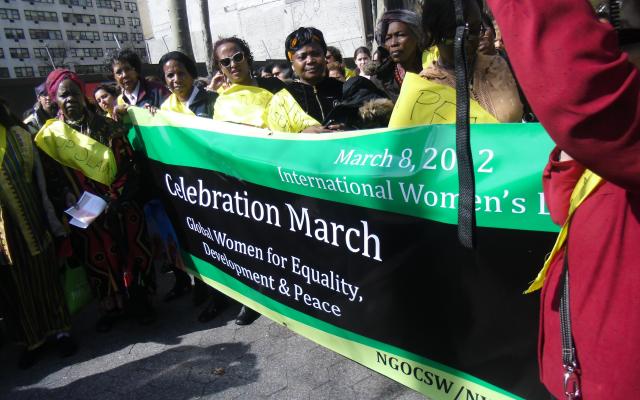
Photo courtesy of Women in Law and Development in Africa
From the Margins to the Center: How Feminists Transformed Global Agendas
From WiLDAF’s experience, one can say that feminist movements have evolved significantly over the years. Feminist actors have become more organized and structured with increased representation at the national levels. They have developed their capacity to identify grassroots issues, conceptualize them, and effectively advocate for change.
In the early post-Beijing period, WiLDAF conducted an organizational audit. One of the key recommendations of that process was to strengthen the Network’s structure by establishing regional offices that would be closer to women in the countries, with a mandate to organize them in each country by creating national networks and identifying priority issues that would inform the work of the broader regional network. Following this recommendation, two regional offices were established: one in West Africa and another in Eastern Africa. In West Africa, this shift enabled WiLDAF to train women on their rights, strengthen their capacity in program design and advocacy, and support the organization of national networks in thirteen countries where WiLDAF is now active. This fieldwork has given the network greater legitimacy, visibility, and credibility in advocacy at the global and regional levels. It has fostered a local-to-global approach, ensuring that advocacy efforts are grounded in the lived realities of African women.
Feminist movements have recognized the necessity to work and act together. For example, during the CSW, networks including FEMNET, WiLDAF, and the Eastern African Sub-Regional Support Initiative for the Advancement of Women (EASSI), among others, came together to create the CSW Africa Non-Governmental Organizations (NGOs) platform. This collective collaborates with NGOs from other regions to organize the NGOs Forum ahead of the official CSW sessions. They coordinate advocacy strategies, which include capacity strengthening and consultations to develop joint position papers, while also sharing responsibilities for mapping key actors during the CSW.
One effective strategy for amplifying feminist voices is the production of shadow reports on the priority themes of the sessions, highlighting the analysis and perspectives of women’s rights organizations. Apart from its role in the development of the synthesis NGOs’ report, WiLDAF West Africa has been active in drafting and publishing its own specific and thematic reports to support targeted advocacy efforts. It also co-organizes parallel events around the CSW priority theme of the year with civil society networks.
WiLDAF’s approach involves bringing together diverse women’s groups into advocacy spaces including women farmers, entrepreneurs, women living with HIV, and youth leaders. This inclusive participation gives these women the opportunity to speak for themselves, engage with policymakers, and present their lived experiences, concerns, and demands.
Further, they have increased the representation and influence of civil society organizations (CSOs) through their involvement in shaping country positions and their presence within the official national delegations. WiLDAF has strongly encouraged its members and other CSOs to advocate for inclusion in these official delegations. When successful, these individuals serve as important liaisons between government representatives and the civil society community at the CSW.
Moreover, WiLDAF provides technical support to its national networks to produce and submit shadow reports to the UN Committee on the Elimination of Discrimination against Women (CEDAW). These reports serve as alternative assessments on the implementation of the CEDAW by States. WiLDAF has actively collaborated with these networks in the drafting process of the official state reports, ensuring that civil society voices are reflected and that the reports accurately represent the realities of women and girls at the national level.
The same strategies have been replicated at the African Union level, where African networks and organizations are brought together within GIMAC (Gender is My Agenda) Platform. Through this platform, various CSOs have participated in pre-summit consultative meetings ahead of the African Union Heads of State Summits to reflect on and provide input regarding the summit themes from a gender perspective.
Countering Anti-Rights Movements: Expanding Civic Space for Women
Conservative forces and anti-gender movements have significantly undermined feminist advocacy, particularly on the recognition and protection of women and girls’ sexual and reproductive health and rights (SRHR). They have often influenced African delegations at global forums, resulting in resistance to commitments related to issues such as female genital mutilation (FGM), forced marriage, and teenage pregnancy. Their influence has also been a substantial obstacle to the ratification, domestication, and effective implementation of key international and regional instruments on women’s rights conventions such as the CEDAW and the Maputo Protocol. In Mali, for example, conservative forces opposed the adoption of a family code based on gender equality. Similarly, Niger has not yet ratified the Maputo Protocol. Conservatism has often prevented official delegates from being open to civil society language. As a result, negotiated outcomes at international forums tend to avoid strong, transformative language, which is less protective for women and girls.
Strategies to Counter the Shrinking Civic Space
In response to the growing restrictions on civic space, feminists and civil society have adopted several safeguards to expand their participation in multilateral spaces. For instance, one key approach has been to work increasingly together, building stronger coalitions and speaking with one voice, which has helped to mitigate the negative impact of shrinking space. Moreover, constructive dialogues and strategic partnerships with decision-makers from the UN and Member States have also proven to be effective. In addition, partnerships with governments have enabled civil society actors to secure greater access, allowing them to influence their positions and increase their representation. Likewise, engaging supportive members of delegations, particularly those open to civil society concerns, has been another valuable strategy to influence country positions from within.
Lastly, as securing venues for parallel events has often been challenging, civil society organizations have, in turn, sometimes approached institutional partners—such as the International Organization of the Francophonie or national embassies (e.g., the Nigerian Embassy)—to secure alternative meeting spaces. These efforts, therefore have ensured that advocacy activities and knowledge-sharing can continue, even in the face of logistical or political barriers.
Lost Gains: How the Political Declaration Fails African Women and Girls
WiLDAF’s work on SRHR promotes the empowerment of girls by raising awareness of their rights and supporting them in claiming those rights, particularly through increased access to reproductive health services. They also address some specific harmful practices such as forced marriage, teenage pregnancy, and FGM which remain critical issues in West Africa. In addition, we advocate for comprehensive sexuality education (CSE) in schools. The lack of explicit recognition of SRHR in the Political Declaration is a serious concern. This omission risks emboldening conservative forces that resist to our this action, undermining years of advocacy work. It could lead to a drastic reduction in funding for programs targeting these critical thematic issues, thereby weakening the capacity of CSOs to respond effectively. Finally, such a gap in the Declaration may reduce government accountability and reduce political pressure to protect and fulfill these rights, especially for young girls and women.
These developments present additional challenges that could seriously hinder WiLDAF’s ability to continue addressing critical issues affecting African women. Consequently, there could be a setback and even an annihilation of the progress achieved in the field and an increase of discrimination and violations of women’s and girls’ sexual and reproductive rights. The gains made over the years risk being undermined, and the space for advocacy on these essential rights may shrink further, threatening the long-term impact of our work.
The CSW Dilemma: A Vital Forum Facing Increasing Restrictions
The CSW, as a multilateral space, has facilitated our advocacy efforts by giving civil society the opportunity to engage directly with States and contribute to assessing progress made in implementing the global agenda on gender equality. This interaction has been crucial for holding governments accountable and amplifying grassroots perspectives on a global stage. But because of various restrictions through the years and the shrinking of the space for civil society from within, the CSW’s effectiveness has been significantly limited. These constraints have made it increasingly difficult for CSOs, including WiLDAF, to use this global space effectively to advance gender justice and women’s rights. In fact, one may wonder whether it is still useful—or whether it still holds the same strategic value—to participate in the CSW, as it has become increasingly difficult to effect change through this forum.
To ensure that the CSW remains a meaningful and inclusive space, and that the broader UN reform process reflects the values of transparency, participation, and accountability, the following recommendations are proposed:
Recognize civil society as true stakeholders and partners of the States. Civil society must be acknowledged not merely as observers, but as essential actors in shaping global agendas and holding States accountable.
Institutionalize civil society participation in official delegations. This can be done by adopting such participation as a guiding principle, while also establishing a mandatory quota for civil society representatives in States’ delegations to the CSW.
Enhance civil society’s role in official proceedings by allocating dedicated and sufficient time for these organizations to present statements during official sessions, and by allowing civil society representatives to participate in the drafting processes of agreed conclusions and final declarations.
Ensure civil society presence during negotiations. It is important to have a definite number of representatives to observe and participate in negotiation spaces, enabling constructive dialogue with States.
- Increase access and space for parallel civil society events by providing more opportunities for such events and facilitating the participation of State delegates to promote mutual understanding and collaboration.
Shaping Feminist Futures: Lessons and Bold Steps Ahead
Feminist advocacy in multilateral spaces has achieved remarkable visibility. Yet too often, the voices driving change are sidelined or tokenized. For feminist work to truly thrive, inclusion must go beyond appearances—it must be intentional, collaborative, and strategic, giving diverse women and allies real power to shape policies, influence decisions, and drive global agendas. The following recommendations outline how the multilateral system can make this vision a reality.
- Institutionalize inclusive preparation processes for CSW sessions: Ensure that the preparation of CSW sessions is systematized and conducted in collaboration with CSO participation, particularly through regional consultations and processes.
- Foster meaningful civil society participation during official sessions: Open up the CSW and other multilateral spaces to greater participation by women from civil society. Strengthen partnerships between governments and civil society during the official session, not just in parallel events.
WiLDAF envisions a stronger and more unified movement that enables feminist movements to be more organized, structured, and inclusive—one that mobilizes and engages a broader base of women, especially young women, as well as men and boys. It is a movement that rallies around a shared global feminist agenda, strategically used to influence decision-making and the outcomes of multilateral spaces.
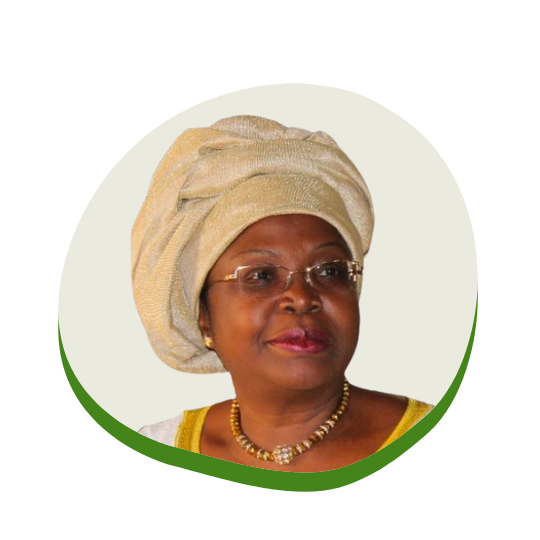
Kafui Adjamagbo-Johnson, a legal expert specializing in gender, has over 20 years of experience in development and has coordinated WiLDAF West Africa since 1997. She played a key role in legal reforms, including the Protocol on the Rights of Women in Africa. A political leader, she heads Togo’s Democratic Convention of African Peoples and was the country's first female presidential candidate in 2010.